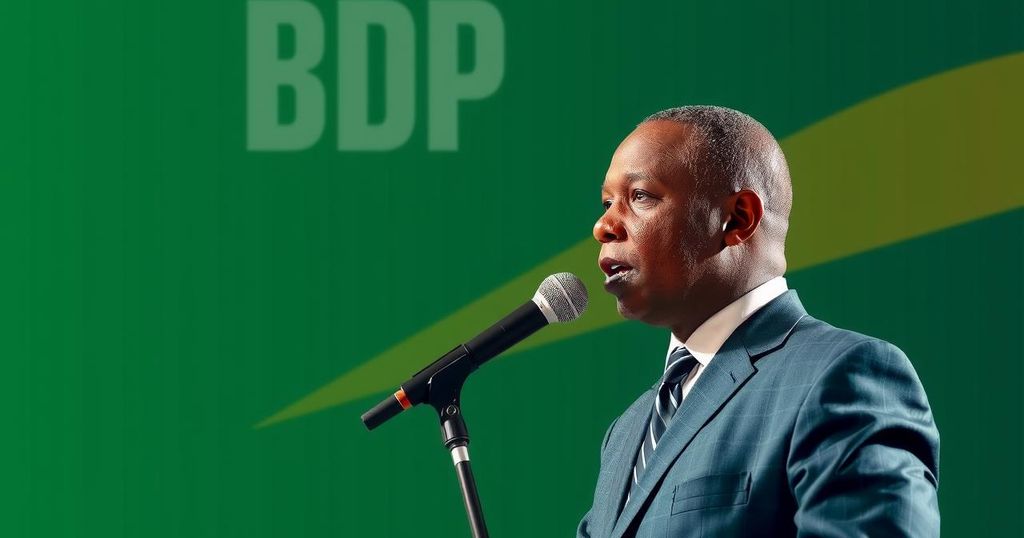Botswana’s BDP Seeks Continuity Amid Calls for Change in Upcoming Election
Botswana’s ruling Botswana Democratic Party (BDP) seeks re-election amid criticisms regarding economic challenges and perceived inadequacies in governance. President Mokgweetsi Masisi promotes the notion of change while addressing high unemployment and inequality. Opposition parties criticize the BDP’s long-standing power, yet their divisions could help the BDP maintain its hold. The election outcome remains uncertain as both governmental and opposition factions navigate internal and external pressures.
Botswana’s governing party, the Botswana Democratic Party (BDP), is seeking re-election in the upcoming general election, capitalizing on its long-standing authority of almost 60 years by proposing the notion of “change” in its manifesto. President Mokgweetsi Masisi, who ascended to the presidency in 2018, emphasizes this theme of transformation amidst growing economic challenges, including significant unemployment rates, particularly among youth. Historical data shows that the BDP has maintained a consistent hold on power since the country gained independence in 1966, often achieving substantial parliamentary majorities. Despite this legacy, the BDP faces mounting criticism regarding economic disparities and unemployment, which have led to a perception of the government as ineffective in addressing the populace’s needs. Renowned political analyst Zibani Maundeni refers to the economy as a “jobless economy,” where the influx of graduates exceeds job availability. At campaign events, President Masisi exhibits confidence, rallying support from constituents while attempting to regain trust during a time when opposition parties, particularly the Botswana Congress Party (BCP) and the Umbrella for Democratic Change (UDC), criticize his administration for its handling of various societal issues, including education reform and perceived corruption. The electoral landscape remains complex, as the opposition’s division may provide the BDP an opportunity to retain power. However, dissent within the BDP also exists, with some party members contesting as independents due to internal disgruntlement over candidate selection.
Botswana is positioned as a nation of notable economic advancement, primarily attributed to its diamond resources, which have bolstered living standards over the decades. The BDP’s historical governance has been marked by political stability and economic development. Nevertheless, current social and economic challenges—such as high unemployment rates and wealth inequality—underscore a pressing need for government reforms, prompting Masisi’s plea for change. Critics argue that the BDP’s long tenure has fostered systemic issues that now necessitate fresh leadership and policy reforms to truly address the needs of the populace.
In conclusion, the upcoming elections present the Botswana Democratic Party with a pivotal moment as it attempts to project an image of change despite its extensive history in governance. Economic difficulties and public dissatisfaction pose significant challenges for the BDP under President Masisi’s leadership. While the party’s historical successes provide a foundation of support, the complexity of the opposition landscape and internal party dynamics will significantly influence the election’s outcome, marking a crucial juncture for Botswana’s political future.
Original Source: www.bbc.com




Post Comment